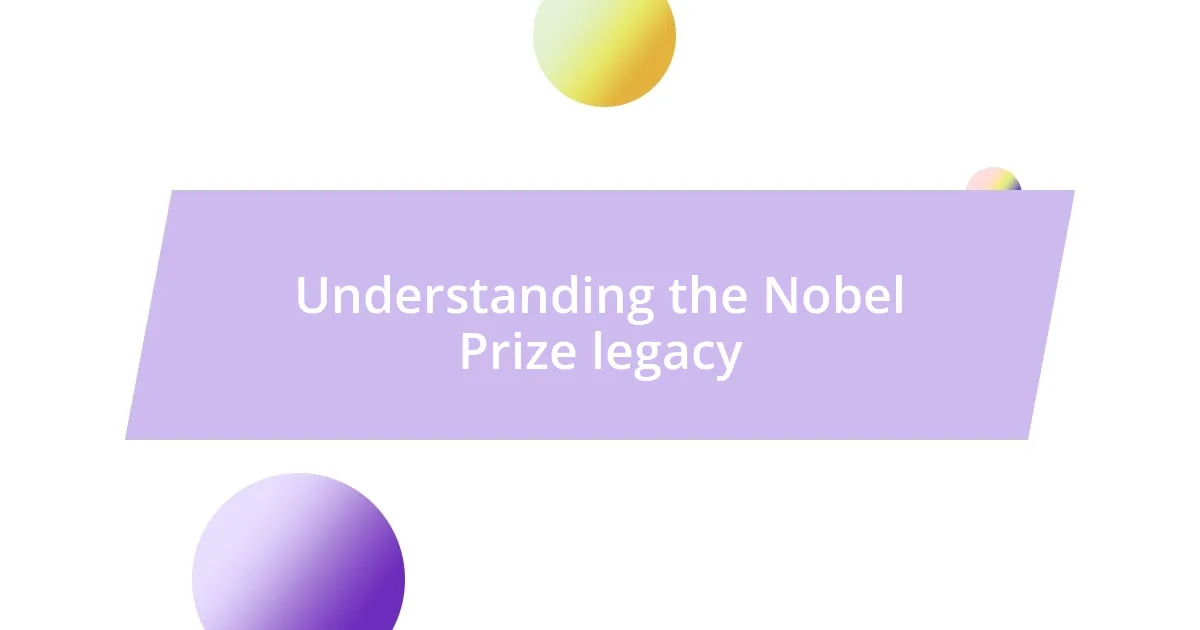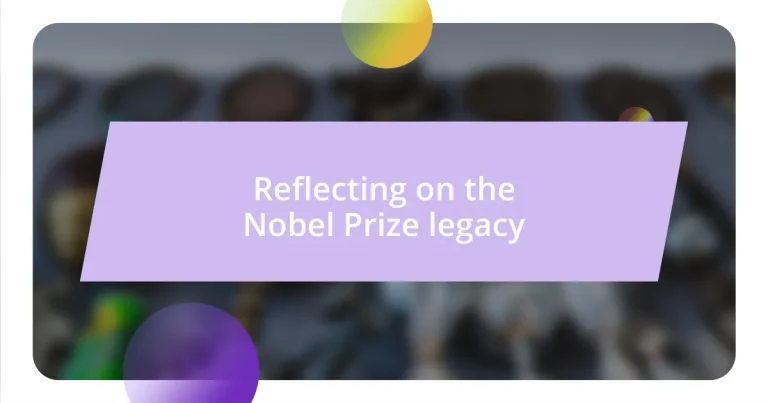Key takeaways:
- Marie Curie’s achievements symbolize breaking barriers in science, showcasing personal tenacity and courage.
- Malala Yousafzai exemplifies the power of advocacy for education, inspiring future generations with her journey.
- Critiques of the Nobel Prize highlight issues of diversity, with calls for more inclusive recognition of contributions from marginalized communities.
- The Nobel Prize’s future may rely on embracing diverse narratives, evolving criteria, and engaging younger leaders to inspire change.

Understanding the Nobel Prize legacy
The Nobel Prize legacy is a fascinating tapestry woven with stories of innovation, sacrifice, and triumph. I remember the first time I learned about Marie Curie’s groundbreaking work—receiving the Nobel Prize not once, but twice. It sparked a realization for me: her legacy isn’t just about her achievements in science, but about the barriers she broke down in a male-dominated field. Isn’t it inspiring to think of how personal tenacity can create ripples of change?
As I delve deeper into the lives of Nobel laureates, I often find myself reflecting on the sheer courage they exhibited, sometimes at great personal cost. Take Aung San Suu Kyi, for instance. Her story resonates with anyone who has faced adversity and persevered. But it raises a thought-provoking question: what does it mean to hold such a prestigious recognition while navigating the complexities of political and ethical dilemmas? In this light, the Nobel Prize becomes not just an accolade but a testament to the heavy weight of responsibility and moral choices.
Every Nobel Prize awarded adds a new layer to our understanding of excellence and humanity’s quest for progress. It reminds me of how interconnected our efforts are, regardless of the field—be it literature, physics, or peace. The legacy is a call to action for those who dare to dream and to challenge the status quo. How can we, in our own lives, embody these ideals? The challenge is one that gives me pause, awakening in me a desire to contribute meaningfully to my community and beyond.

Notable winners and their contributions
While reflecting on notable Nobel Prize winners, I can’t help but admire the work of Malala Yousafzai. Awarded the Nobel Peace Prize at just 17 years old, her relentless advocacy for girls’ education has changed countless lives. I remember watching her speech at the Nobel ceremony, filled with courage despite the dangers she faced. It made me realize the profound impact one voice can have in the fight for justice and equality.
Another laureate that stands out to me is Albert Einstein. His contributions to the understanding of physics, especially through the theory of relativity, transformed our view of the universe. I recall a moment when I was grappling with the complexities of physics in school, feeling overwhelmed. Reading about Einstein’s journey, I found inspiration in his resilience. His work did not just enlighten a scientific community; it also encouraged budding physicists like me to embrace challenges and pursue knowledge relentlessly.
In the realm of literature, Toni Morrison’s addition to the Nobel ranks resonates deeply with me. Her powerful storytelling gave voice to the underrepresented and explored the intricacies of African American experiences. Engaging with her novels has been a life-changing experience, shedding light on societal truths often overlooked. Each time I dive into her work, I feel a sense of responsibility to understand and confront the realities around me, mirroring the legacy she left behind.
| Nobel Winner | Contributions |
|---|---|
| Malala Yousafzai | Advocate for girls’ education and youngest laureate for peace |
| Albert Einstein | Introduced the theory of relativity, reshaping our understanding of physics |
| Toni Morrison | Highlighted African American experiences through impactful literature |

Critiques of the Nobel Prize
The Nobel Prize has faced its share of critiques over the years. One area of concern is the perceived lack of diversity in the selection process. As I explore this, I can’t help but wonder why many deserving individuals, particularly from marginalized communities, seem to get overlooked. It raises an important question: Is the selection committee truly reflecting the global tapestry of talent and contributions?
- Critics often point out:
- The tendency to award laureates from Western countries, which can overshadow achievements from the Global South.
- The exclusion of groundbreaking figures, like notable women and people of color, who have made significant contributions yet remain unrecognized.
- Controversies over awarding prizes to figures with questionable moral standings, which can undermine the integrity of the Prize itself.
Reflecting on these critiques, I find myself thinking about the essence of recognition. When I was in college, I participated in a community service project that empowered underrepresented youth—a project that, in my opinion, deserved more acknowledgment. It felt disheartening to see such important work go unnoticed. This personal experience shapes my understanding of how crucial it is for institutions like the Nobel Prize to evolve and embrace a more inclusive narrative, ensuring that every valuable contribution is celebrated.

Future of the Nobel Prize
As I think about the future of the Nobel Prize, I can’t help but feel that it needs to adapt to a changing world. With the rise of social media, voices from all corners of the globe are amplifying issues that demand attention. I often wonder, how can the Prize harness this global dialogue? It seems crucial that the selection committee embraces these diverse perspectives to ensure the award remains relevant.
Moreover, the criteria for what constitutes a “worthy” contribution might need to shift as society evolves. For instance, I recall my university days, where passion projects often seemed overlooked in favor of traditional achievements. This has led me to reflect on the myriad of ways individuals impact society, from community organizers to innovators in the arts. Shouldn’t we celebrate such contributions, even if they come from outside established norms?
Lastly, envisioning the future, the Nobel Prize could play a pivotal role in inspiring younger generations. I remember being captivated by stories of past laureates, and I can’t help but think about today’s youth who face numerous challenges. What if the Prize not only recognized extraordinary accomplishments but also engaged with young leaders actively working to create change? This could ignite a passion for innovation and advocacy, fueling a legacy where future laureates become mentors to aspiring changemakers.














